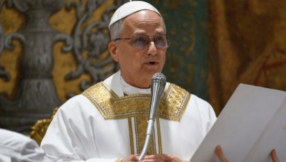
A saint named Mellitus died on this day in AD 624. You might not have heard of him, but he's an icon of Church history who played an essential role in bringing Christianity to pagan Britain.
Mellitus was a man on a mission. Pope Gregory the Great was trying to bring Christianity to Britain's largely pagan shores. In AD 595 he sent the man who would become Augustine of Canterbury to Britain. But Augustine needed help and soon Mellitus was sent, alongside others, to assist. Mellitus was probably a Roman nobleman whose devotion to Christ had previously brought him to life in a monastery in Rome.
His new voyage saw him become the first Bishop of London, still one of the Church of England's top appointments (London currently awaits the selection of its next bishop).
Mellitus oversaw this growing city as well as the eastern English region known as Essex. Mellitus was committed to his cause, but he faced opposition. When Sæberht, a Christian convert and King of Essex died, his pagan sons took his place. They allegedly demanded to be served the sacramental bread of the Eucharist by Mellitus, but he refused and they forced him out of London into exile in Gaul, western Europe.
Mellitus eventually returned and became the third Archbishop of Canterbury in AD 619. One great miracle is attested to his life, where he diverted a fire in Canterbury that threatened the church there. He allegedly entered into the flames, and the wind changed the direction of the fire.
Mellitus' legacy continues to this day. St Mellitus College in London is a thriving, innovative theological college, one of the largest ordination training hubs in the Anglican Communion.
Its website describes the legacy of its namesake: 'Mellitus was a missionary bishop. Naming our college "St Mellitus College" is not an act of antiquarian curiosity – it is laying claim to that same costly spirit of missionary love, the desire to see Christian churches growing and building for God's kingdom across this region and beyond, and seeing theology in service of that aim.
'That spirit is as important to Christians in the pluralist 21st century world as it was for their counterparts in the pagan 7th century land of the East Saxons.'













